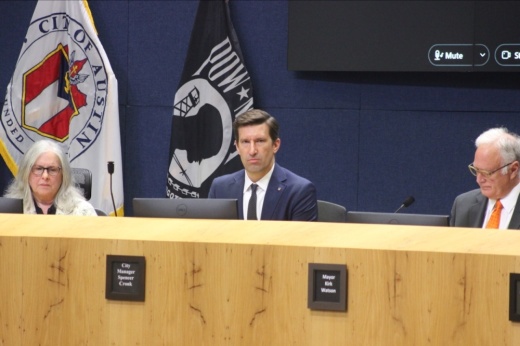Cronk, the former Minneapolis city coordinator, began working as Austin’s city manager in 2018 following the resignation of his predecessor Marc Ott, who left for an executive position in Washington, D.C. Cronk’s tenure of just over five years lasted through a period of continuing population and economic growth; investments in new transit infrastructure such as Project Connect; focus on rewriting the city’s land development code; and emergencies including 2018’s serial bombings, the COVID-19 pandemic, demonstrations over police brutality and multiple weather disasters.
Cronk will leave City Hall with his full $388,190.40 salary for fiscal year 2022-23 and other benefits. Cronk's severance package totaled $463,001.50, and his removal is effective Feb. 16.
“I serve at the pleasure of the mayor and council and acknowledge their decision. In our council-manager form of government, the elected officials ultimately decide whether I am the right choice for them to lead our organization,” Cronk said in a statement released after council's vote. “I stand proud of our organizational accomplishments under my tenure. I thank the Austin community for the opportunity to lead this great city, and I thank our city employees for their consistent commitment to providing the very best public service.”
Council members also appointed former city manager Jesús Garza as Cronk's interim replacement during their Feb. 15 special meeting. Garza will earn a $350,000 base salary this year plus $19,038.46 in deferred compensation contributions, a $7,200 executive allowance, a $1,845.32 total cell phone data and device allowance, and other standard city benefits.
Garza most recently managed the Stand Together Austin political committee that reported spending more than $316,000 last year in support of Mayor Kirk Watson's election campaign. Garza and Watson served together as city manager and mayor, respectively, from the 1990s into the early 2000s when both separately resigned.
Garza will serve until a new city manager is appointed. He declined to comment on his appointment Feb. 15.
The formal end of City Council’s relationship with Cronk came around two months after the previous council dais voted to grant him a $38,188 raise in an 8-0-3 vote while expressing general confidence and support in his job performance. The February agenda item to cut ties with Cronk was sponsored by Watson and co-sponsored by Mayor Pro Tem Paige Ellis and Council Members Chito Vela and Alison Alter—who, until recently, had been the only official to publicly express discontent with Cronk's overall management work.
Council's cutting of ties with Cronk came after dissatisfaction with Austin’s handling of the ice storm had led Watson and some of his colleagues to call a special executive session last week to evaluate Cronk’s employment. That meeting was then further escalated by Cronk’s public actions ahead of an impending council vote on a new deal with the Austin Police Association.
Some council members took issue with Cronk's approach to those labor negotiations, which had stretched on since early last year. Oversight provisions in the contract also tie to a pair of propositions that will appear on the May election ballot, and some officials have pushed to ensure the contract is separated from any decision voters might make.
Cronk’s announcement of a tentative four-year contract with the police union late Feb. 8 came less than one day before officials were set to vote on a one-year alternative backed by several council members. A city press conference held by Cronk and police leaders prior to council's consideration of that item Feb. 9 later drew criticism during the meeting, most vocally from District 4 Council Member Vela who sponsored the one-year proposal.
Debate over the labor agreement saw Vela accuse Cronk of intentionally confusing the issue and pushing a plan that would bypass the will of Austin voters; the four-year police contract includes oversight measures differing from those featured in competing May ballot measures, one of which was backed by a group funded almost entirely by the APA.
Council postponed a final decision on a contract until a Feb. 15 special meeting. Members later added the agenda item to consider Cronk’s severance benefits as well as a transition plan for city management, which they discussed before debating their approach to the police contract.
Council approved Cronk's removal and an interim management plan in a 10-1 vote, with District 1 Council Member Natasha Harper-Madison against.
"When I consider the depth and breadth of challenges our community is facing, I do not believe terminating the city manager is the most measured or reasonable decision at this time," she said in a statement. "Today, I chose not to support the immediate termination of our city manager because this action will not solve the systemic issues within our city government or our collective response to the recent winter storm."
Several officials supporting the move on from Cronk shared thanks for his service and thoughts on the outlook for his successor.
“Running a big, dynamic city such as Austin is an enormous job, and Spencer has been a committed public servant throughout his time as city manager," Watson said in a city release.
"This is an important decision that my colleagues and I took seriously," District 6 Council Member Mackenzie Kelly said. "Being city manager for a city the size of Austin is a challenging and demanding job. I would like to thank Spencer Cronk for doing this difficult job and for his time and service at the city. I wish him all the best in his future endeavors."
District 2 Council Member Vanessa Fuentes shared her thanks for Cronk's service ahead of Garza's appointment.
"The city of Austin must operate with a clear vision of responsiveness, trust, and transparency. Our city is rapidly growing, and with this comes the need to overcome many new and existing challenges. I believe the decision to appoint Jesus Garza as our Interim City Manager reflects our commitment to move forward and serve those we represent," she said.
"Today is a new day in Austin. The people of our city expect and deserve a transparent, accountable government that works for all of its residents. The only way to overcome the many challenges facing our community is as one united community," District 9 Council Member Zo Qadri said.
Alison Alter also thanked Cronk and said she hoped the vote marks a step toward improved city management.
"Today we took an important vote for the future of our city. I remain steadfast in my hope for a community that can do more than weather storms—an Austin that can deliver essential services, foster trust, grow our workforce and lay the foundation for families to thrive," she said in a Twitter statement. "Public service is never easy, and I want to thank both Spencer Cronk and his family for the sacrifices they made in service to our community."
"I want to thank Spencer Cronk for his years of service to our city and wish him well in his next steps," District 5 Council Member Ryan Alter said in a statement. "I look forward to working with Jesús Garza in the interim as council begins the search for a new city manager. He's an experienced public servant who will not only guide our community with a steady hand in this transition period, but also allow us to continue to push forward to address the critical issues facing Austin."
“The city manager has a tough job, and I want to thank Spencer Cronk for his dedicated work over the last five years, and I wish him well. I’m very pleased that former City Manager Jesús Garza will come out of retirement to help lead the City of Austin at this critical juncture as we begin the search process for a new city manager," District 7 Council Member Leslie Pool said. "Austin is one of the largest cities in the country. We need the kind of leadership that will help us with the significant and weighty challenges that come with our growing role in this country and across the globe.”
Elle Bent contributed to this report.





